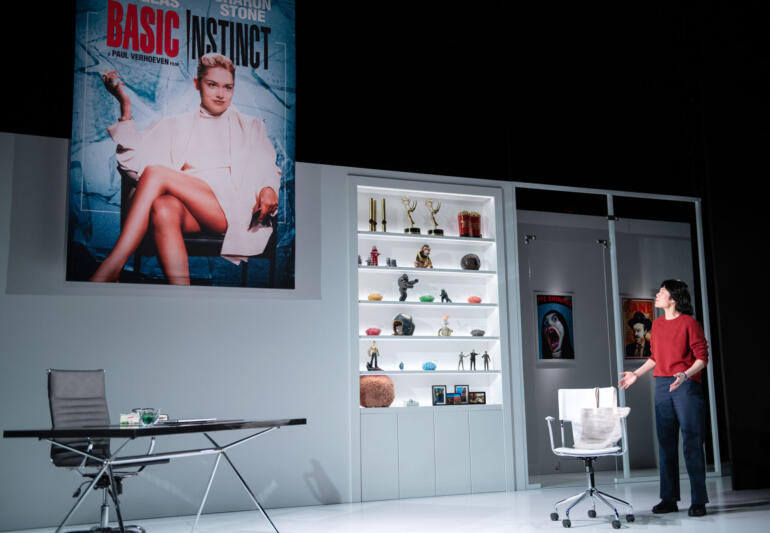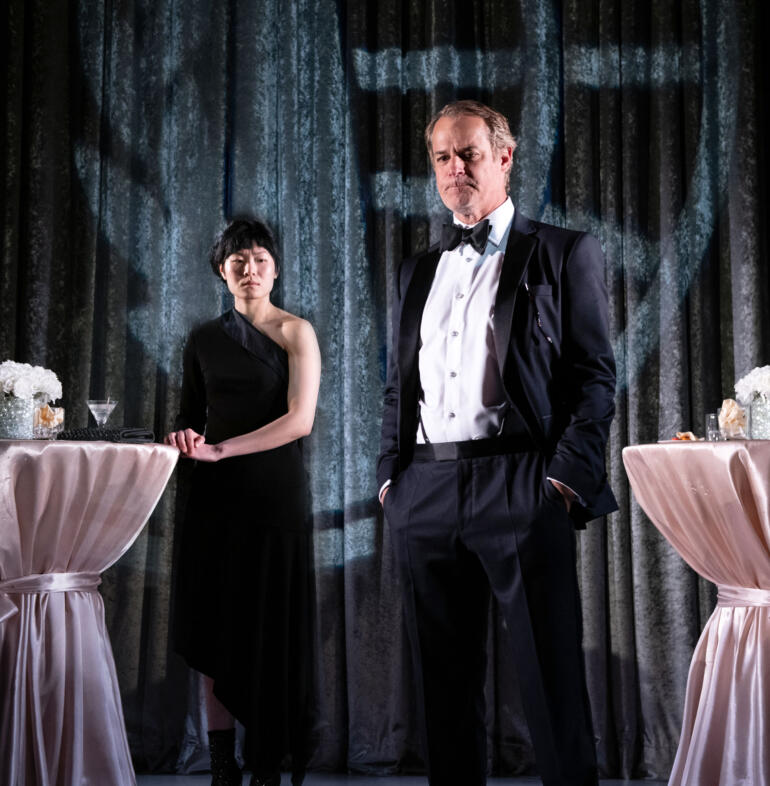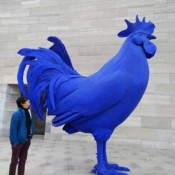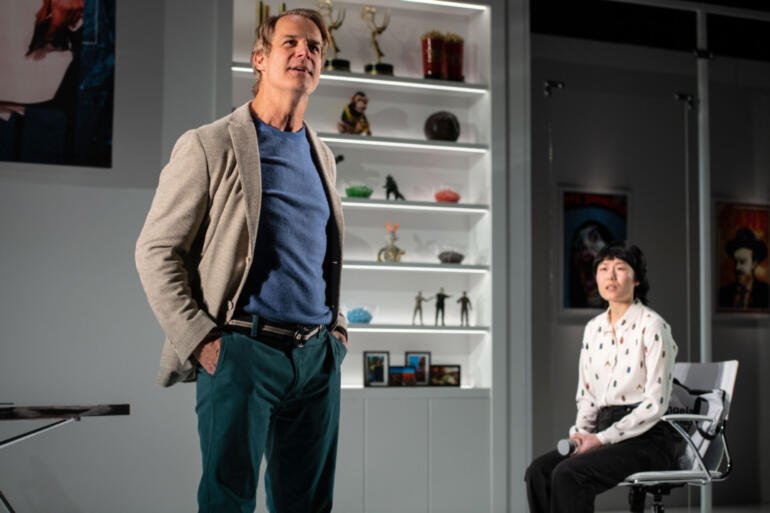“Exclusion” opens with the main character, Katie Eng, waiting anxiously in Harry’s office, the man who will make or break her budding career as a TV producer. Harry has the Midas touch, everything he produces for the networks turns into a hit.
But it’s not her nervous energy that draws my attention. It’s Sharon Stone. More specifically, Sharon Stone holding an unlit cigarette, sitting suggestively in a poster that’s probably graced every teenage boy’s wall back in the 1990s. It’s a gigantic print of the movie poster for “Basic Instinct” hanging just behind Harry’s desk.
If you grew up in the 1990s, you probably know exactly what part of the movie that poster is from. I don’t remember much from that era of Hollywood but one thing vaguely stands out in my memory- that most of the hit movies that came out during that decade were chock full of gender stereotypes as well as culturally and racially insensitive material- qualities which Basic Instinct had in spades.

Karoline in “Exclusion” at Arena Stage at the Mead Center for American Theater running May 5 through June 25. Photo by Margot Schulman.
Fast forward three decades, and it seems Hollywood seems a little more enlightened. Movies are ostensibly more aware and sensitive to today’s cultural, social, and racial mores. Tinseltown has adopted code words and tropes more palatable to the so-called “woke” audience. That’s apparent when Harry finally arrives to meet Katie to talk about optioning her book about the Chinese Exclusion Act and turning it into a television show. He claims to love the book.
Katie’s tome explores the aggressive racism and harsh treatment of Chinese immigrants in the early 19th century which began with the Page Act of 1875, which specifically banned Chinese women from entering the United States. Seven years after that the government signed the Chinese exclusion act, prohibiting the entry of all Chinese people into the United States. It was the first and only major law that prevented all members of a specific national group from immigrating to the country. That would not be repealed until 1943. Even after that, there was a yearly quota restriction of 105 Chinese immigrants that wasn’t scrapped until 1968.
Despite the blatant government attempt to erase the Chinese American experience, immigrants from China still played a major role in shaping the United States as a young nation. The country’s first transcontinental railroad was mostly built by underpaid Chinese laborers who immigrated to California during the gold rush in the 1840s. But you won’t find many of these Chinese men in photos celebrating the laying of the railways, because they were deliberately excluded from the pictorials.
The erasure of people of color from U.S. history isn’t anything particularly new. Anyone who’s bothered to actually learn about the founding of this country knows that it was born of violence and exploitation, especially of black and minority peoples. What seems to be different is the country seems to be more willing to look back at the ugliness of it all, whether it be politically, socially or culturally. Kenneth Lin’s “Exclusion” tries to explore this willingness, and whether it is a genuine attempt at a reckoning with the past. It’s a great production that will make audiences think about how stories about Asian Americans are told and the difficulties of making them an entertainment product for the mainstream market.
Ahmad Coo is the executive producer for the Global Business show on CGTN America. His analysis represents his views alone.
Big-time television producer/writer Harry, played brilliantly by Josh Stamberg, is seemingly among the enlightened. He wants Hollywood to tell the difficult stories about the country’s past, especially with the exclusion act and the brutality the Chinese experienced. He praises Katie’s book especially for its depiction of some anti-Chinese riots after the passing of the exclusion act. One of the largest mass lynchings to ever happen in America happened in Los Angeles. In one harrowing passage, Katie writes about the real-life lynching of a Chinese doctor. Begging for his life, the mob cornered him and shot him in the face. Then they cut off his penis and hang him with it in his mouth.
Despite the terrifying imagery, Harry heaps praise on Katie for her book, calling it a “f___g towering work of genius” and gushing about her script based on it. But unfortunately he says the whole script is a little bit “on the nose”. Katie’s visibly taken aback but tells Harry there’s nothing in the script that did not happen. Harry then hits her with a request for a rewrite, saying that art is more true than facts.
In Kenneth Lin’s version Hollywood, the more things change, the more things stay the same. The industry wants to be enlightened, but on its own terms. It was obvious from the very beginning that Harry wasn’t really serious about telling a true story of the Chinese American experience, especially early in the play when he called Basic Instinct the “greatest f___g movie of all time, underrated and under-effing-appreciated.”

Karoline and Michelle Vergara Moore in “Exclusion” at Arena Stage at the Mead Center for American Theater running May 5 through June 25. Photo by Margot Schulman.
It becomes obvious to Katie that her book and script is just another money-making bet for a Hollywood bereft of ideas and originality. It’s not lost on this writer that movies like “Crazy Rich Asians” and television shows like “Fresh Off the Boat” made hundreds of millions of dollars.
Just take a look at the U.S. entertainment industry and its increasing balkanization. There’s money to be made in pandering to a fracturing market. Just browse any of the streaming services, and you can find any show or movie produced by a major Hollywood studio that caters to every ethnicity, sexual identity, etc.
I actually love that this is happening because a lot of underserved audiences get to see characters on screen that look like themselves. I nearly wept when Korean American star Sung Kang of “The Fast and The Furious” franchise was portrayed as a tough guy with an edge who also amazingly bedded Gal Gadot in one of those movies. Before that, Asian men in Hollywood were asexual and nerdy just like Long Duck Dong of that racist piece of sh_t movie “Sixteen Candles”.
But Hollywood’s embrace of the “otherness” of others and monetizing it in films and television shows haven’t been perfect, as Kenneth Lin highlights in his play. You want your people’s story told? You have to do it our way- and usually the people who decide how your story is mangled and sold- are overwhelmingly white and male.
Katie tries to fight to remain true to her vision for her book and script but it’s futile. Even Viola, played by MIchelle Vergara Moore, who is chosen to play the lead role for the show is asking Katie not to fight the changes Harry’s writers make, even if her character who started out as a doctor/seamstress is turned into a “dirty, diseased whore” in the rewritten script.
It’s obvious why Viola is willing to accept the changes, even if she has to portray a prostitute. She tells Katie that she’s been acting for a long time and had a lot of dreams.
“It’s what’s out there for me,” Viola said. “You think I get a lead role in a greenlit TV show everyday?”

Karoline and Josh Stamberg for “Exclusion” at Arena Stage at the Mead Center for American Theater running May 5 through June 25. Photo by Margot Schulman.
Kenneth Lin has probably run into situations like this several times during his career in Hollywood. I have no doubt that he still does. He echoes his experiences through Katie and the humiliations and frustrations. And he’s probably suffered defeats as deflating as Katie’s in the play. Finally after a few run-ins with Harry over the treatment of her script, Katie is fired from her own production.
Despite Katie’s dismissal, the show goes on to become a massive hit and makes Viola a superstar. It even goes on to win a Humanitas award, which its website describes as “a prestigious ceremony celebrating film and television writers whose work explores the human condition in a nuanced, meaningful way.”
If this was an ideal world, Katie winning the Humanitas award for her book about the Chinese Exclusion Act and adapted script would have been a fitting end to a story. But Kenneth Lin knows reality is a much harsher mistress, especially after spending years in Hollywood. Tinseltown calls for a much simpler calculus, predicated on profits. Big-time producers like Harry are the people who decide how your story will be told and how it will be sold. It was a hard lesson for Katie to learn.
Fortunately for Katie, she knows the Chinese American experience can’t be contained in just one television show. It’s an ongoing story of exclusion that will keep on spawning other shows, movies, theatre, etc. In the final scene of “Exclusion”, Katie finally transforms into a version of Harry, her tormentor and mentor, albeit one in control of her own fate and story.
 CGTN America
CGTN America
 Karoline and Josh Stamberg in “Exclusion” at Arena Stage at the Mead Center for American Theater running May 5 through June 25. Photo by Margot Schulman.
Karoline and Josh Stamberg in “Exclusion” at Arena Stage at the Mead Center for American Theater running May 5 through June 25. Photo by Margot Schulman.

